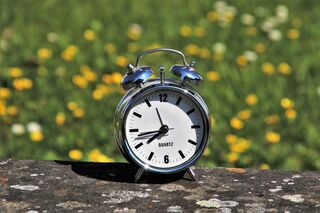Sleep
Why Morning Sunlight Is Crucial After Turning Back the Clock
Morning sun synchronizes mood, sleep, concentration, and many body functions.
Posted October 30, 2020

The daylight savings switch
The fall/winter clock known as Standard Time—when the sun directly overhead anywhere on earth equals noon local time—is better aligned with the body’s internal timekeeper, or circadian clock, than Daylight Savings Time is.
In normal years, the change from Daylight Savings back to Standard Time is hard on many people. The COVID pandemic piles on even more obstacles. When individuals who now work from home arise they tend to stay indoors. They no longer have a commute or a walk to their workplace that normally would expose them to sunlight and the short wavelengths that predominates early in the morning. They often lack a set routine, too, which strains against one’s circadian clock.
Blue light matters
These short wavelengths, together with the intensity of morning light, signal to the suprachiasmatic nucleus in the brain’s circadian clock that it’s “Time to wake up!” The gradual rising of morning light furthermore synchronizes many bodily functions from appetite, digestion, and urine output to hormone secretion, mood, and concentration. Household lighting, even when measured at a window, is far dimmer compared to light intensity outside, even on an overcast day.
Both brain and body have the hard task of keeping track of three different biological measures of time: the 24-hour sun clock that monitors the proportion of light and dark we get each day; the physiological cycles that govern everything from urine output and potassium excretion to alertness and the ability to concentrate; and the societal schedules of work, school, recreation, and social interaction.
Switching back and forth isn't good
Earlier, I wrote two bookend columns about the downsides of forcibly switching the clock back and forth twice a year: one on the sometimes deadly health perils of forcing the body’s clock forward each spring, and the other on why switching back to Standard Time again in the fall not only irritates some people but corresponds with spikes in the incidence of heart attacks, strokes, vehicle crashes, work injuries, depression, and suicide.
Taken together, I hope these bookends help you appreciate how important your circadian clock is to your wellbeing.

The clock’s performance is well within your control, and fighting against it is possibly the worst thing you can do. Recommendation by the American Academy of Sleep Medicine, the American Academy of Neurology, and other authorities who study chronobiology recommend that you establish regular bed- and wake-up times that you adhere to, even on the weekends.
Get your sunlight to get in sync
Shop for groceries, swing by the pharmacy, and run errands during daylight hours for the same reason that you should generally avoid bright light in the hours leading up to bedtime. The intensity of and predominant blueness cast by fluorescent lighting make it hard to wind down. At home, dim the room lighting and dial back your screen brightness, or better yet, set it to switch to Nightshift mode automatically. Blue shortwave light is the brain’s wake up signal. The reason you should minimize exposure each evening is the same reason that blue LED dashboard lights help late-night drivers stay alert.
Unless your bed faces east, your bedroom has no window coverings, and the rising sun hits you in the face, then throw open the blinds as soon as you get up. Go outside and look up. Take a walk or sit where you can gaze into the sky. Forget your sunglasses. You want the eye’s special retinal ganglion cells to register the morning light. Doing these things will help sensitive individuals better adjust to the “fall back” clock change.
And as for the clock reset, use the extra hour to sleep rather than to stay up late. Society is chronically sleep-deprived as it is, your body is going to get a big jolt on November 1, and yes it a big deal and not merely “one hour.”
Please email comments via the Author Profile link below.
References
Sleep: the Clean-up Crew for a Dirty Mind
Four Ways to More Restful Sleep
Daylight saving time: an American Academy of Sleep Medicine position statement: https://doi.org/10.5664/jcsm.8780
Malow, B.A., O.J. Veatch, and K. Bagai, Are Daylight Saving Time Changes Bad for the Brain? JAMA Neurology, 10.1001/jamaneurol.2019.3780.


